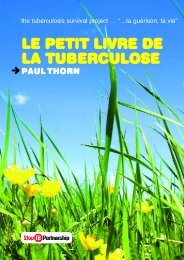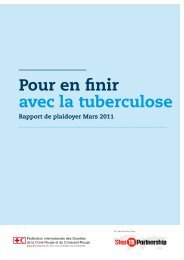Thailand - Stop TB Partnership
Thailand - Stop TB Partnership
Thailand - Stop TB Partnership
You also want an ePaper? Increase the reach of your titles
YUMPU automatically turns print PDFs into web optimized ePapers that Google loves.
with HIV/AIDS. 146 In recognition of their key role in both advocacy and service delivery, the<br />
MoPH provides around $2 million (75.6 million baht) annually for the activities and services<br />
provided by HIV/AIDS NGOs, including on <strong>TB</strong>/HIV. 147<br />
By contrast, the involvement of NGOs (including HIV/AIDS NGOs) around <strong>TB</strong><br />
has been minimal, and has tended to focus on service delivery. For example, the Thai <strong>TB</strong><br />
Foundation provides grants to <strong>TB</strong> patients (to defray transportation and food costs), research<br />
organizations (to support academic work and lab equipment), and even the <strong>TB</strong> Cluster itself<br />
(to help nurses cover incidental costs related to patient follow-up). 148 Neither government nor<br />
NGOs have made enough of an effort to engage former <strong>TB</strong> patients in <strong>TB</strong> control programs,<br />
though engagement of people living with HIV/AIDS has proven crucial to AIDS advocacy.<br />
Engaging <strong>TB</strong> patients in policy development or advocacy efforts may be more challenging<br />
since <strong>TB</strong> is not a life-long disease. Nevertheless, some <strong>TB</strong> experts urge the NTP to consider<br />
developing a strategy to promote the greater involvement of recovered <strong>TB</strong> patients in <strong>TB</strong><br />
control efforts. 149<br />
Some NGOs consider the low level of general awareness and knowledge about <strong>TB</strong><br />
(even among HIV/AIDS NGOs) to be one of the principal barriers to greater community<br />
involvement. <strong>TB</strong> is often considered a highly “academic” subject, and community activists<br />
often feel they lack the necessary expertise to engage with health workers and policymakers.<br />
This suggests a need for stepped-up NTP and international support for <strong>TB</strong> treatment<br />
literacy activities, involving former <strong>TB</strong> patients whenever possible. Ensuring that accurate,<br />
nonacademic, Thai-language information about <strong>TB</strong> is readily available at the community<br />
level is the first step to increasing demand for high-quality <strong>TB</strong> services.<br />
Other community leaders and activists claim that they have experienced resistance<br />
from public health experts when they have tried to learn more about <strong>TB</strong> and to become<br />
involved in <strong>TB</strong> policymaking processes. One NGO activist claimed that public health workers<br />
often consider <strong>TB</strong> too “academically complicated” for community activists to grasp, and<br />
that <strong>TB</strong> experts “are very knowledgeable, but don’t trust that NGOs can also work on these<br />
issues . . . just because they have not been formally trained.” 150 Another decried the government’s<br />
failure to enact a “participatory approach” with regard to <strong>TB</strong>. 151<br />
Again, HIV/AIDS NGOs could play a leadership role in sparking greater community<br />
activism around <strong>TB</strong>, as they have demonstrated the effectiveness of treatment literacy<br />
activities in enhancing the accessibility of scientific knowledge; increasing the demand for<br />
services; and positioning community activists as key participants in the design, implementation,<br />
and evaluation of policies and programming. NTP or donor-sponsored research of the<br />
techniques adopted by Thai HIV/AIDS NGOs and networks could be critical in encouraging<br />
better understanding of their applicability with regard to NGO activism around <strong>TB</strong>. Finally,<br />
according to some <strong>TB</strong> experts, enhanced NGO partnerships could be a particularly critical<br />
64<br />
<strong>TB</strong> POLICY IN THAILAND



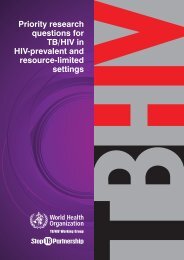
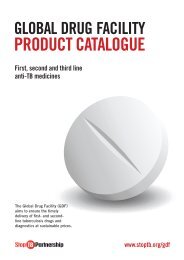
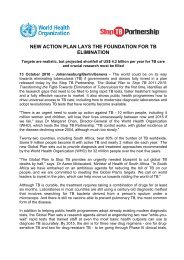
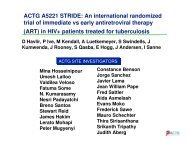
![Global Drug Facility Annual Report 2011 [.pdf] - Stop TB Partnership](https://img.yumpu.com/26788745/1/184x260/global-drug-facility-annual-report-2011-pdf-stop-tb-partnership.jpg?quality=85)

![Concept note on national stop TB partnership [.pdf]](https://img.yumpu.com/26788741/1/184x260/concept-note-on-national-stop-tb-partnership-pdf.jpg?quality=85)

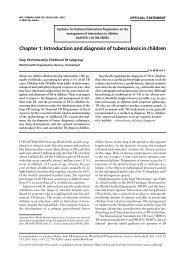
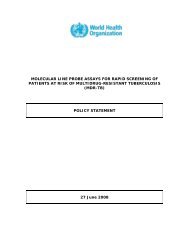
![2005 and Challenges for 2006 - 2015 [.pdf] - Stop TB Partnership](https://img.yumpu.com/26788674/1/190x245/2005-and-challenges-for-2006-2015-pdf-stop-tb-partnership.jpg?quality=85)
![Brochure (French) [.pdf] - Stop TB Partnership](https://img.yumpu.com/17234792/1/190x91/brochure-french-pdf-stop-tb-partnership.jpg?quality=85)
